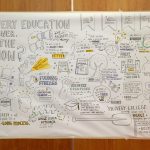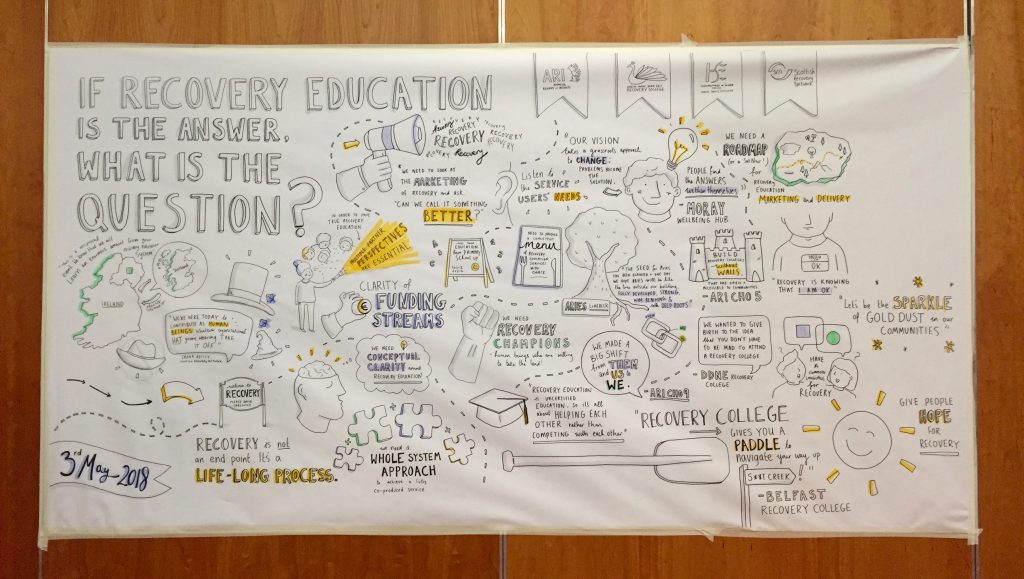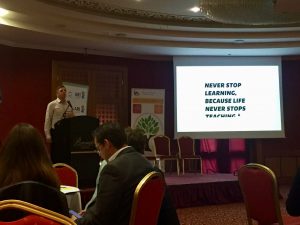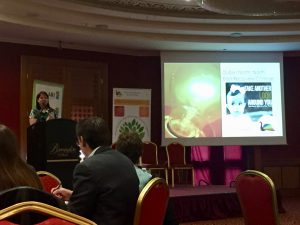Reflection: 3rd May 2018, Dublin, Conversation Café – “If recovery education is the answer, what is the question?”

Event delegate “Mental health in itself is an opportunity to reclaim and rediscover community. There is a crisis in community.”
Being invited to attend an event in another country and share our approach and learning from Moray Wellbeing Hub, is a huge thing for us as Champions. It gives us a sense that the power of influence is changing in Scotland and wider, giving a wider opportunity for the voice of experience to shape the opportunities for people in the future.
Not since my birth in Belfast had I been on the island of Ireland so the opportunity to make a, short, visit to Dublin was not to be missed. Heidi and I had been invited by Frank Reilly of the Scottish Recovery Network, to attend a day conference following on from an event last November in Glasgow (read more here), in Dublin with the title of ‘If Recovery Education is the answer, what is the question?’. The format for the day was to be similar but this time I would be co-presenting a ‘Pecha Kucha’ with Heidi for the first time.
Amanda & Clare, South East Ireland Recovery College, “Recovery education invests in people and sustained by culture”.
Attending this event were a wide range of individuals from across Ireland from policymaking roles and those currently experiencing challenges in their mental health, to social workers and recovery facilitators.
The event was opened by Liam MacGabhann from Dublin North, North East Recovery College, with his colleague John Kelly; who we had met before when they came to Scotland for the previous event in November 2017.
Frank then gave his introductory remarks, including encouraging people to remember that, “Today is about not rushing to an answer before you try to solve it”. He shared that recovery practice begins and ends with people themselves and asked people to put their roles or ‘hats’ aside and to consider their own perspectives as people as part of what is going on today.
From this, we moved into the first ‘Conversation Café’ of the day. You are probably familiar with the format from Moray Wellbeing Hub events. There were many tables in the room (around 150 people there) and each was facilitated by one person to keep the conversations on track while another nominated person took copious notes on what was discussed. One new feature was that we were asked to vote using stickers on two key points that arose from the chat to share with the room.
Belfast Recovery College, “ You might not get a degree in it, but you live to a better degree”
The first conversation was ‘The Question’ – ‘What do we need for recovery education to flourish in Ireland?’. We were asked to think about:
- Where are we now?
- Is this where we want to be?
- Where do we want to be in 2020?
Of course, I was not at all familiar with the Irish experience of recovery education so it was my role to introduce some of the concepts and practice that we have been modelling in Moray and to learn from those around the table where they were on that journey. From our table discussion, it was felt that Ireland is just at the start of the recovery education journey but that could be seen as a strength and allows them to open up to new ideas from across Europe and the world. It was a very positive feeling I got and they seemed to like the Moray approach as well.
Our group included people who had a range of formal roles, from social work to supporting those with intellectual disability, but all shared ideas and reflections from their own lives. Once we selected our top three to feedback, we heard from each table of which there were 11 with at 8 folk at each.
The discussion was enthusiastic and showed the commitment and interest all had, but also the very wide diversity of perspectives. Much of the challenges and opportunities sounded familiar to us, some of the language was different including a wider exploration of the words ‘co-production’ and ‘colonisation’.
Some points that were highlighted:
- Growing interest in a social movement approach and recovery education being inclusive at all life stages.
- Promotion, publicity and use of language and the whether the use of the word of ‘recovery’ was useful came up a few times.
- A strong interest in sustainability and coordination of education courses sitting outside of health care and within the community.
- A need for flexibility and providing choice and options for the individual where they were at, not where others thought they ‘should’ be.
- Using recovery education as a mechanism for hearing and empowering individual voice (self-advocacy).
- Recovery education being mainstreamed and no longer being the exception.
Frank then reflected on these hopes and on how things have evolved in Scotland; encouraging people to look at what was possible. He reminded them that, “people are the core resource, money helps”, not the other way around – this has certainly been our learning at the Hub.
Following the first conversation café there was around the room sharing of the main points from each table which, to me, continued to emphasise the positive feeling towards the recovery approach.
After that came the ‘Pecha Kucha’ presentations – 20 slides with 20 seconds to talk about each one with no stopping! As always these proved to be both inspiring to see and thought-provoking as well.
My favourite was the Belfast Recovery College who had a lot of humour, photos and cartoons as well as poignancy in their presentation. They also made some key points such as the vital importance of reception and admin staff to live the values as being the first contact point for people.
We’ve included notes on each presentation at the end of this reflection.
Martha, Dublin North, North-East Recovery College, “Our souls need healing and through recovery education we can do this”
Heidi and I went last, and I think we managed to get through it without making any mistakes. Afterwards, we were both approached by several delegates to thank us for the presentation and how authentic it had been and how respectful of each other we were. I think we just did what any Champions of the Hub would do using our core values, but it was encouraging that it was so well received.
After lunch back to the second conversation café – ‘The Answer”
- Do any of the approaches presented meet the needs identified in café 1?
- For recovery to flourish in Ireland what do we need to experience in recovery education?
At this point I decided to move tables, just to get some more connections. I was a bit surprised that we were not all invited to move around but never being afraid to bend the rules I just sat on another table and introduced myself. The afternoon discussion was just as lively and, occasionally, heated as the morning session, even though the intensity of the day was leaving some a little tired. Our table found this question more difficult to come to any conclusions on and I was aware that there might be some resistance to the recovery approach in certain parts of the health service system in Ireland, but I’m not familiar enough with it to really comment on that.
Event delegate, “If you have to use a phrase that necessitates an explanation then that is no good.”
Again, there was an opportunity to share key points in the room and Frank skilfully summarised and enhanced each of these as we went along. He commented that there was unity and a thread that ran through all the table’s comments – the values were common. He encouraged everyone to remember that the information from today needed to be actioned not just noted.
Key points from that afternoon discussion included;
- The importance of learning and merging the thinking
- Recovery being everywhere and not being afraid to use the power of humour.
- Whole system approach had to include policymakers.
- Social contact approach that MWH spoke about was of interest.
- Recognising communities can be created and exist anywhere.
- “We are in the community but are we of the community”.
- Discussed needing to identify champions wherever they are and a need for leadership.
- Taking ownership of our own mental health
- Meaningful equality is needed, people need to be valued and feel ownership.
- Resources and supervision are important for Champions.
- ‘Feeling’ is vital, warmth is given from the venue, the refreshments. That you feel welcomed.
- Assertive engagement, going into homeless hostels, for example, recognising that people need to be reached where they are.
- Recovery comes through the community connections.
- “Mental health in itself is an opportunity to reclaim and rediscover community. There is a crisis in community.”
- Getting to a stage where MH professionals can get to a stage where they can be open and honest about their own mental health challenges.
- What is a valid recovery journey and what is ‘good enough’? – keep it from the person’s perspective.
- “There are inherent skills within people themselves, not just the communities they are within. This needs resources and can be achieved by being reciprocal.”
Finally, all of the Pecha Kucha presenters were on stage for a quick Q&A session which allowed for some further questioning on issues raised during the day.
Catherine Brogan, Advancing Recovery in Ireland (ARI), closed the day with noting that at the start how anxious yet intrigued we felt, but that once we started to focus on the question and recognised the passion that we have in this room the excitement built. That we were exploring the everyday and all elements of community. That the Pecha Kutcha really helped the key points come out, that we held on to the nuggets that folk presenting wanted to share with us. That everything that we gather here today will help in the evolution of recovery colleges and education in the future.
Overall this was a great conference and I learned a lot about recovery education in Ireland. I came away with the impression that, although the movement in Ireland might be younger than Scotland, the direction of travel seemed very familiar and there was a common approach. Further to this, there was much we could learn and share between our two countries.
Ewan
(includes Heidi’s reflections and notes).
Notes from the Pecha Kutcha presentations:
Clara, North Dublin / North West.
- People had locally planned services they then got the funding and went back and sense checked this was what people wanted.
- Recovery education meant meaningful change – move from ‘them’ and ‘us’ to ‘we’.
- There was clearly an appetite for coproduction, therefore they ensured that coproduction was in the service plan
- Coordination has come from those delivering the work, the five local teams of recovery workers supporting one another.
- The national recovery framework had helped them imbed in to strategic planning
- Their main challenge is to increase the number of people of involved and burnout of using the same core people.
- They were open to recognising that their recovery values were not completely there including using their own experiences.
- The system has been a challenge around things like websites.
- There is a disconnect between national expectations and local implementation, but they are working toward changing this.
John and Martin, Belfast Recovery College.
- Hope was the focus for them.
- Education focus is important to show that we as service users are intelligent humans able to learn and grow.
- Education is power.
- Great phrase used by presenters, “ You might not get a degree in it, but you live to a better degree”
- Challenging stigma and using common sense is core to what they do.
- They recognise the importance of admin, the people who answer the call and the courage it takes people to decide to try a course.
- Spoke about being in a “recovery mode”
- They compared to what they do with the Levellers – a movement that wanted to share the land in Ireland.
Mike and Eileen, Limerick / Claire / North Tipperary (mid-west Ireland)
- Use the name ‘Aries’, founded in 2013 from a working group.
- Found there was need for a recovery service, involved service users and family members and staff from the start.
- Facilitators were a priority as was content creation. Modules created locally in true coproduction.
- Partnerships are vital to them, local and national.
- The presentation itself was part of coproduction approach.
- Deliver to medical students at local university. Roll out to deliver to all mental health staff in area.
- Personal and professional development and quality is of the highest standard to ensure people can take pride in their work.
- Challenge getting health and social care staff released and making courses accessible across the areas. Also drop off of participants in courses and supporting transport and suitable venues.
- See gaps and challenges as opportunities like working with young people.
Martha, Dublin North/ North East Recovery College
- They saw that recovery colleges sometimes merged mental health services so they wanted to birth an emancipatory service.
- “Freedom, it’s an inside job. We can only free ourselves”.
- They deliver education and community development, “delivering a more just and equal society”.
- Working outside comfort zones and challenging all of us.
- Welcoming opening space, fun is important.
- 2016 seed funding came through, and started with beacon or starter courses.
- Since 2016 25 courses, 749 attended, 95 professionals.
- Have access to library groups amongst other courses.
- Gaps are getting into the heart of communities and buying in from professionals.
- Constant threats in responding to needs and developing new things, helps them to get innovative such as their youth champions programme.
- Their governance structure is outside the system – that helps them.
- Recognise that demands on services are unsustainable and we need to
- “Our souls need healing and through recovery education we can do this”
Amanda and Clare, South East Ireland.
- There organisational focus asks itself how to develop an whole service approach.
- Shared some of the older mental health buildings, originally run by the matron, and how things have changed since then.
- They have a physical hub – their first challenge was getting a dedicated space as a hub.
- MH and addiction is brought together – a novel approach for Ireland.
- “Recovery education invests in people and sustained by culture”.
- 498 is this year’s enrolment.
- Want to develop career pathways and support national connecting up for facilitators.



